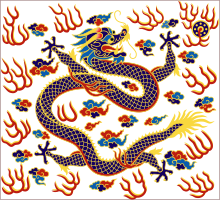The Plain White Banner (Chinese: 正白旗; pinyin: Zhèng Bái Qí) was one of the Eight Banners of Manchu military and society during the Later Jin and Qing dynasty of China. It was one of the three "upper" banners (Plain Yellow Banner, Bordered Yellow Banner, and Plain White Banner) directly controlled by the emperor, as opposed to the other five "lower" banners.[1][2] The Hoise Niru was a military unit associated with the Plain White Banner.
| Plain White Banner | |
|---|---|
 Plain White Banner | |
| Active | 1601 – 1912 |
| Country | Later Jin |
| Part of | Eight Banners |
| Commander | the Emperor |
| Plain White Banner | |||||||
|---|---|---|---|---|---|---|---|
| Chinese name | |||||||
| Chinese | 正白旗 | ||||||
| |||||||
| Mongolian name | |||||||
| Mongolian Cyrillic | Шулуун цагаан хошуу | ||||||
| Manchu name | |||||||
| Manchu script | ᡤᡠᠯᡠ ᡧᠠᠩᡤᡳᠶᠠᠨ ᡤᡡᠰᠠ | ||||||
| Möllendorff | gulu šanggiyan gūsa | ||||||
Notable members
edit- Dorgon
- Dodo
- Duanfang
- John Kuan
- Ronglu
- Yinchang
- Nergingge
- Empress Xiaoshurui
- Youlan (Gūwalgiya)
- Consort Donggo
- Consort Dun
- Minggatu (Mongol)
- Imperial Noble Consort Chunhui (Han)
- Shoushan (a descendant * of Yuan Chonghuan) (Han)
- Wanrong, The Empress Xiaokemin Titular Empress of the Qing, Empress of Manchukuo, Wife of Puyi, The Xuantong Emperor
Notable clans
editReferences
edit- ^ Wakeman 1985, p. 158.
- ^ Elliott 2001, pp. 404–405.
Bibliography
edit- Elliott, Mark C. (2001), The Manchu Way: The Eight Banners and Ethnic Identity in Late Imperial China, Stanford University Press, ISBN 9780804746847
- Wakeman, Frederic Jr. (1985), The Great Enterprise: The Manchu Reconstruction of Imperial Order in Seventeenth-century China, Berkeley: University of California Press, ISBN 0520048040